
AMERICAN ARAB
“It’s giving voice to people who have been marginalized—and when they are presented in mainstream American media, it’s rarely from their perspective… At the same time, the movie doesn’t feel confrontational. It feels like the start of a conversation, rather than a provocation.”— Ben Sachs, Chicago Reader
“Probes what you might call the Arab-American dilemma… Alshaibi’s family is smart and complicated, and you immediately have an emotional connection to these people.”— Nina Metz, Chicago Tribune
“American Arab is a gift, an important document and beacon of hope for a community and people too often misunderstood, with disastrous consequences.”— Ravi Chandra, CAAMFest
“Alshaibi has deep roots in the underground, having made narrative and documentary films that push both thematic and stylistic boundaries. His 2007 film Nice Bombs documents his trip back to Baghdad to see his father shortly after the Iraq War broke out. American Arab picks up this thread of personal narrative and explores what it means to be an Arab-American, post-9/11. Further, in the great tradition of American personal documentary film, Alshabi also struggles with what it means to be a filmmaker who happens to be Arab-American. Less concerned with aesthetics than ideas, he uses the camera as a tool to dig for answers about identity, art and filmmaking that are often overlooked.”—Michael Galinsky , International Documentary Association, documentary.org
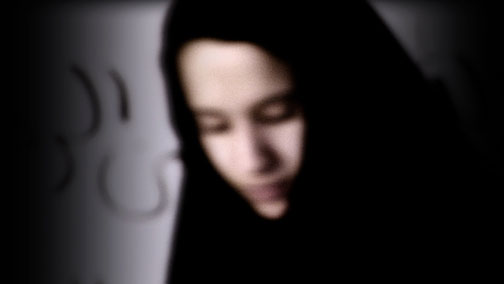
PROFANE
“Like a bargain-basement version of Gaspar Noé’s Enter the Void, this Chicago-shot feature by Usama Alshaibi (Nice Bombs) uses a panoply of shock tactics—rapid editing, blurry superimpositions, drug use, and S-M—to evoke nauseous fascination with the sexual underworld. And like Noé, Alshaibi seems as curious about religious transcendence as degradation. The heroine, a Jordanian immigrant, works contentedly as a dominatrix but wants to reconnect with her Muslim roots; scenes of her lurid career alternate with a sweet subplot in which she befriends a religiously devout Middle Eastern cabdriver. Though certainly not for the squeamish, the movie is a striking story of life in the Arab diaspora, aided rather than undermined by its occasional narrative incoherence.” — Chicago Reader
“Torn between ecstasy and submission, Muna takes an unorthodox path to enlightenment, one that Profane dramatizes with documentary methods and psychedelic imagery. Alshaibi demonstrates that true reverence sometimes requires transgression.” – The Boston Phoenix
“A deeply felt journey into psychosexual horror”-Time Out Boston
“This is one of the most heretical and daring visions of sexuality ever filmed, transgressive in a way comparable to how Last Tango in Paris was 40 years ago and Shortbus five years ago. Iraqi-American filmmaker Usama Alshaibi probes the psyche and mileu of Muna, a Muslim dominatrix for whom extreme kink and piety are blended seamlessly into her life. Manal Kara gives what is simply one of the most courageous and sexually penetrating performances ever filmed. It’s on a par with the sexual breakthrough performances of the iconic films of Nagisa Oshima (In the Realm of the Senses, Taboo). Moreover, erotic guilt-driven fantasies of the American soldier comprise an added fascinating layer to this magnificent work. Arguably the best movie ever to be set in Chicago.” – Lavender Magazine

NICE BOMBS
“Disarmingly casual, seemingly artless “personal diary” docu “Nice Bombs” makes decidedly sophisticated use of home-movie aesthetics in its exploration of Iraq at the onset of the American Occupation as Baghdad-born, experimental filmmaker Usama Alshaibi, accompanied by his Kansas-bred blond wife and his estranged father, returns to the country and the extended family he hasn’t seen for 24 years. Opening July 11 at Gotham’s Pioneer Two-Boots, thoroughly engaging docu, exec produced by Studs Terkel, inserts snapshots of an unfamiliar country in violent transition within the entirely recognizable context of a normal, if long-delayed visit home.”–Variety, Ronnie Scheib (read more)
“Loaded with candid conversations and opinions about the hot-button issues of war, terrorism, and Islamic extremism,‘Nice Bombs’ offers many different Iraqi and American points of view and portrays a time and place of nightmarish complexity.”- New York Sun, Bruce Bennett, (read more)
“When Studs Terkel urges you to do something, you do it. “He sort of put me on the spot,” recalls Usama Alshaibi, who was working at the Chicago History Museum as a sound engineer when his project sparked Terkel’s interest. It was January 2004 when the legendary author and historian came into Alshaibi’s office and asked about his family in Baghdad. Alshaibi replied, “Well, I have this idea about going to Iraq and interviewing my family….” And that’s what set Terkel off. “He said, ‘You have to go!’ ” Alshaibi says. “He pulled out his checkbook and gave me my first donation.” –Time Out Chicago, Jason Mojica, August 10, 2006 (read more)
“Alshaibi does something so simple yet, sadly, so neglected: He lets a Western audience see Iraqis not as crazed Middle Easterners shouting and shooting (and dying) en masse, but as individuals going about their daily lives—shopping, listening to the radio, hanging out. Those shared-humanity moments make all the more compelling the postscript phone call, in which Tareef tells Alshaibi that, since his visit, Iraq has gone from tolerably bad to almost irredeemably worse.”—Time Out Chicago, Novid Parsi August 2006
Critics Choice “Chicago filmmaker Usama Alshaibi grew up in Iraq and the U.S., and although he recently became an American citizen, his personal video documentary has plenty to say about the day-to-day existence of his Baghdad relatives, whom he visited in 2004. Distance tends to simplify our view of anything, and this video humanizes the situation on the ground mostly by complicating it: in a voice-over Alshaibi says he’s often asked what “”the Iraqis” think, but by the end this question has become as meaningless as asking what “the Americans” think. Much of his previous work has been experimental, but this becomes formally adventurous only near the end, as he converses by phone with a cousin who tells him how much worse the situation has grown this year.”-Jonathan Rosenbaum, Chicago Reader.
“I was born in Iraq,” says Usama Alshaibi, “and was recently sworn in as a citizen of the nation that was now attacking it.” At the start of his documentary, Nice Bombs, it’s March 2003, and Alshaibi is safe in Amsterdam, honeymooning with his new wife Kristie. On TV, protests against the war are loud and numerous, followed by the seemingly unavoidable invasion. Within weeks, when Usama and Kristie are back home in Chicago, the Saddam Hussein statue falls and looting commences. Alshaibi observes, “I had a feeling that the news I read and saw was not telling me the full story.”-by Cynthia Fuchs, PopMatters
“In early 2004 Chicago filmmaker Usama Alshaibi returned to his native Iraq with his wife, producer Kristie Alshaibi, and his camera. He had been away for nearly a quarter-century. The result is a surprisingly warm first-person video diary, blending a series of reunions with Alshaibi’s vast array of relatives and footage of the bazaars, streets, homes and everyday perils of life in post-Saddam, mid-occupation and mid-chaos Iraq.”-Michael Phillips, Chicago Tribune
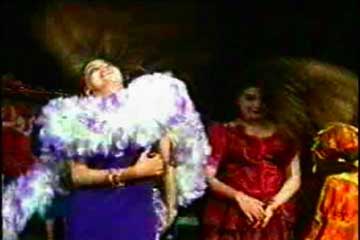
VIDEO BABYLON
“On one side of a split screen, Saddam Hussein smiles. He’s celebrating the birthday of his youngest daughter in a lavish palace party. The revelers even sing “Happy Birthday” — in English — to the beaming child. On the opposite side of the screen, in a harrowing juxtaposition, Iraqis are beaten and tortured. One sequence shows blindfolded prisoners of Saddam’s regime, strapped with explosives, led into the country and blown apart by remote control. Chicago’s Usama Alshaibi, an Iraqi-American filmmaker, pieced together the short film, “Bombshell: Iraqi Secret Videos and Artifacts From a Fallen Regime” from video compact discs bought from Baghdad street vendors for as little as 50 cents. “It’s a type of evidence,” says Alshaibi, 34, best known for Chicago’s erotic-themed Z Film Festival, which he co-curates with his wife, Kristie. “All the drama of the occupation, the toppling of the statue of Saddam Hussein — all of these things were not witnessed by Iraqis in the streets. They were witnessed through TV or on these videos,” he says.” –“Back to Baghdad,” By Rob K. Elder, Chicago Tribune (November 18, 2004)
“Usama Alshaibi, a Chicago video maker who was born in Baghdad, assembled this program of video clips that offer an alternate perspective on the Iraqi experience. Most are in Arabic without subtitles, and some are music videos: one, shot at sea, shows boatmen backing up a pop singer; another is a Ba’athist ditty extolling the virtues of Saddam Hussein; a third, The Saddam Rap, lampoons the fallen dictator. Most unsettling is a short whose split screen contrasts innocuous home movies of Saddam with footage of his torture victims. Alshaibi will also present a 12-minute excerpt from his work in progress Nice Bombs, a DV documentary about his family’s return to Iraq after nearly 24 years abroad. Interviews with stoic residents and bewildered American soldiers are shot in a distinctively raw style that suits the edginess of the times, leaving one curious for more firsthand testimony from those weathering the occupation. 52 min. Alshaibi will take part in a discussion after the screening.” –Chicago Reader (November 20, 2004)
“…Iraqi-American filmmaker Usama Alshaibi also makes some striking juxtapositions with his work “Bombshell: Iraqi Secret Videos and Artifacts from a Fallen Regime,” which split-screens a smiling Saddam Hussein birthday party and underground torture videos as well as images of Donald Rumsfeld shaking hands with Hussein in 1983. “‘Bombshell’ is saying many things at once,” explains Alshaibi, who lived in Iraq as a child and just recently visited his homeland. “I’m just showing the history of Iraq: the U.S. intervention, but also keep in mind that Saddam was the United States’ main guy, we helped him produce chemical weapons, so it’s the schizophrenia of war and Iraq as a symbol of many things.” Alshaibi, who just received his U.S. citizenship in May 2003 and lives in Chicago, now feels more confident about using his art to engage with current politics. Before he became an American, he says, “I thought if I said the wrong thing, they were going to put me in an orange suit and ship me away.” He is currently working on “Nice Bombs,” a feature documentary about his return to Iraq as an adult, which screens as a 12-minute work-in-progress in Chicago. “I have to admit that when the U.S. was about to overthrow Sadaam, I was ecstatic,” he says. “But that honeymoon is quickly fading. As Iraqis will say, ‘The only good thing that the United States has done was getting rid of Saddam. Everything else they’ve completely messed up.”– ‘American Prejudice: Arab Films Try to Breakthrough Bias’ by Anthony Kaufman, Indiewire (November 2004)
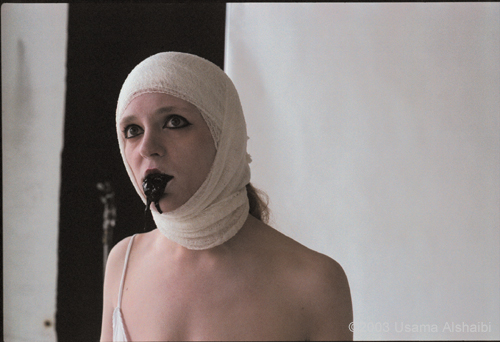
CONVULSION EXPULSION
“An adventure in pornographic surrealism, CONVULSION EXPULSION redefines the term “Money Shot”. Blinding footage and a sea of of synthetic noise compliment this short’s volcanic conclusion. Starring Kristie Alshaibi as Echoplasm, who poses the question: “How long can a phantom made of pure sound be trapped as solid and visible matter?” CONVULSION EXPULSION will leave a stain on your brain and quite possibly your shoes.”-Cucalorus Annual Festival of Independent Film
“The film has visuals as shocking to the eye as this music may be to some ears. A women painted like a china doll, and wrapped in gauze, twitches and gyrates in various states of nudity. She lurches like a robot as she projects what we hope is fake blood out of her anus, which she proceeds to rub over her legs, vagina and nude body. The film brings to mind the work of the Vienna Actionists, or perhaps more appropriately the work of Paul McCarthy and Mike Kelley whose works drew strongly from the model set forth by them.”–Indieworkshop.com
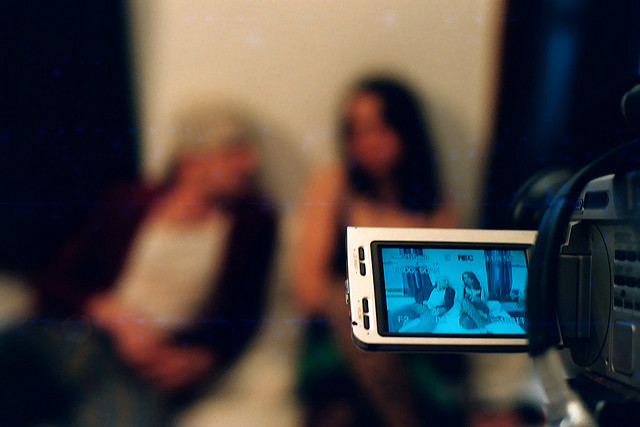
THE AMATEURS
“Alshaibi’s alter ego in The Amateurs is much more aggressive than what we believe the real Ashaibi, the one who directs the film portraits, to be. For the most part, he keeps himself removed from the on-screen “action.” He remains mostly behind the camera cajoling his two male cohorts to do terrible things to the women who have arrived for the shoot. The film is a comedy with the humor arising both from Alshaibi’s ridiculously bold requests and the males’ reluctance to do what he asks even when the women seem agreeable, sometimes too agreeable.
It’s an interesting turning of the tables on the sexes. The men are humiliated when they act sensitive towards the women. Both the female subjects and Alshaibi the director directly insult and humiliate them. But when push comes to shove and Alshaibi is forced to take the reigns, even he is unable to consummate the acts he desires to watch.
While much of The Amateurs is extremely funny, two scenes are unbearably tense. The first comes from knowing a little bit about Alshaibi outside of the Solar Anus Cinema disc. It’s not identified beforehand, but one of the women in the film is Alshaibi’s real-life wife, Kristie. The closest to sexual touching — and I want to point out I’m not referring to anything explicit here — comes when Alshaibi touches Kristie in ways to show the men what he wants done to her. During these scenes one starts to wonder how far Alshaibi is going to go with this charade.
The film then concludes with it’s most tense situation yet. The Amateurs, although knowing it’s fiction, has a very strong, realistic documentary feel to it and by doing things like casting his real wife, one starts to wonder how much fiction and documentary are influencing each other. The final scenario involves a girl who doesn’t speak English and her drunk, unconscious boyfriend. The violence is ratcheted up to an almost unbearable level when one just doesn’t know how much is acting and how much is real. Does the actress speak English or no? Is that guy really drunk or is he exceptionally convincing? Setting up these tense sequences is when Alshaibi shows off his greatest skill as a transgressive filmmaker.”-By Mike Everleth, Badlit.com
“… a movie that gleefully relishes in depicting every white bread suburban parent’s nightmare as young girls are coerced by the ‘foreign’ directors into appearing in a porn video. The filmmakers argue in heavily accented English about how best to stick a speculum into a young girl’s vagina in a sequence that glorifies both sexual transgression and contemporary anxieties about the racial other. The fear of white slavery updated as somebody’s daughter is coerced into giving a fat drunk a rim-job. Alshaibi’s command of his materials is so strong that some audiences don’t know if the film is raw footage of porn auditions, documentary, or satire. And thankfully he’s not telling”. – Jack Sargeant (from Deathtripping: The Extreme Underground)
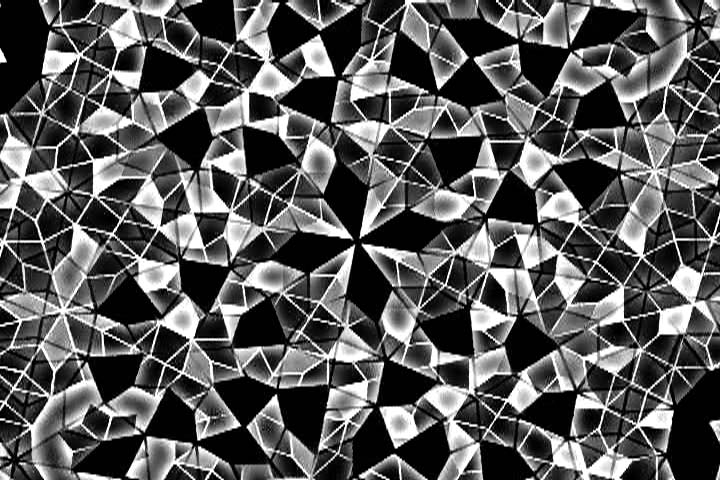
ALLAHU AKBAR
.”…shimmying geometries celebrate the liberation from image making.” -From Aniconism to Bliss: Media art shows its Islamic roots, Pacific Cinematheque,Vancouver, Canada
“In Allahu Akbar, the US based filmmaker Usama Alshaibi has created joyful and playful animations out of the traditional geometric themes of Islamic art. These complex geometries are rendered in simple black and white, and then superimposed and spun around their central axis, in a close rhythmic relationship with the lively soundtrack of traditional and popular Iraqi music. The result is a giddy playfulness, reminiscent of psychedelic Pop Art, and far removed from the contemplative quiet I normally associate with Mosques and the inner courtyards of traditional Arab architecture. The video also recalls the films of Harry Smith. My only complaint is that, for a person like me who really loves this music, I could have watched a much longer film which used at least one complete musical selection!”-Resistence(s) DVD Review by David Finkelstein, Film Threat
“Usama Alshaibi’s Allahu Akbar, whose hypnotic geometrical patterns seem inspired by Islamic art but whose bouncy sound track rebukes ultraorthodox Islam’s prohibition of sensual pleasures, including music.” –Fred Camper, recommended program, Chicago Reader (Nov.21, 2003)
“Alshaibi’s five-minute video animation Allahu Akbar, a mesmeric montage of morphing geometrical patterns from Islamic art, flashed to the beat of Middle Eastern music.” -Ted Shen, Chicago Reader (August 28, 2003)
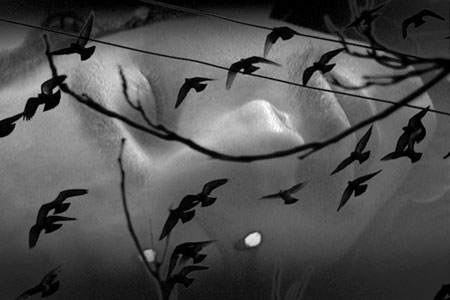
MUHAMMAD AND JANE
MICRO-FILM “There’s nothing like a good dose of paranoia to feed the senses, according to Chicago filmmaker Usama Alshaibi. His film MUHAMMED AND JANE is a black-and-white tale about an Iraqi-Polish man, Muhammed (Piotr Tokarski), attempting to return to the United States with a few illegal passports under his belt. Once he gets past airport security, albeit in a sweat-induced state, he is increasingly dogged by claustrophobic fear in his quest for a place to stay. He finds it and subsequently meets Jane Doe (Melina Paez), a girl running through the alley and mutually haunted by some unimaginable force. She and Muhammed instantly click; the only catch to their bliss is that which Jane is running from, dealing with dead bodies and a good deal of suspicion.
Because this film is set just prior to the time when the United States invaded Iraq in early 2003, one could surmise that Jane represents the U.S. as she is hunted by her own intentions, with Muhammed becoming her unknowing counterpart. Their relationship foreshadows a different match destined to be made in real life, although not one nearly as happy as theirs, and raises an interesting point as far as speculating how the relationship between the U.S and Iraq will develop over the coming years.
An American born of Iraqi descent, Alshaibi has the unique ability to creatively tap into current events with a fresh and involved eye. MUHAMMED AND JANE takes an experimental form, informed with a narrative storyline and envisioned with the hand-held and unforgiving, observational quality of a documentary. Its scenes consistently demand interplay between these elements and Muhammed’s state of mind, which implores for him to always look over his shoulder, and benefits from fantastic performances by Tokarski and Paez. “ – Erin Anadkat, MICRO-FILM #7 (Spring 2005)
Daily Southtown“An intriguing and artful hot button drama filmed in Chicago, “Muhammad and Jane” examines the budding romance between a shady Muslim immigrant with roots in Poland and Iraq and a mystery woman, who each have their own reasons to avoid the authorities.” -Dan Pearson Daily Southtown film critic (Sunday,August 24, 2003)
Chicago Reader“A laconic drifter (Piotr Tokarski) born in Iraq returns to Chicago to straighten out his U.S. immigration status, and though a friend warns him of the prevailing anti-Muslim sentiment, he unwisely hooks up with a desultory woman (Melina Paez), accompanies her to a hedonistic party, and attracts the attention of the FBI. Local video maker Usama Alshaibi is the sort of canny visual stylist who can sustain a mood even when the storytelling falters, which is certainly the case here: the characters’ motives are vague, the plotting episodic, but the handheld videocam, tight close-ups, and disorienting angles create a potent sense of paranoia. The haunting score is by Andy Ortmann and Camilla Ha.” -Ted Shen, Chicago Reader (August 28, 2003)
Centerstage,Chicago “ The film takes place one year after the 9/11 attacks and exhibits the fears of the muslim culture in our society. Paranoia strikes a young Iraqi man as he returns home to the United States. Once again a glimpse of our society is shown in striking detail. This country itself isn’t known for being incredibly tolerant of others. The terrorist actions of a few have labeled many in the minds of our citizens. Nevertheless, Usama Alshaibi’s film shows real promise. His personal style is unlike any other ever seen. During several conversations random images begin overlapping the scene. It’s distracting at first but it forces you to listen to the conversation. If given the chance to develop this craft it could be a very effective tool on a grander scale.” -By Peter Mazza, Centerstage, Chicago (August, 2003)

THE Z FILM FESTIVAL
Chicago Tribune“As the 41st Chicago International Film Festival continues to roll out the stars and high-profile screenings, adventurous cinemagoers with a taste for the artistic extreme will get just that this weekend with the fifth annual Z Film Festival. Like previous incarnations of this homage to beyond-borders cinema, fest directors Usama and Kristie Alshaibi have lined up a program that’s sure to be an equal-opportunity offender.”
“We try to select things that show a filmmaker’s unique gifts,” Usama said. -(read more) “5th Z film fest is last in line of outsider events” By Richard Knight Jr, Special to the Tribune, Published October 14, 2005
“…the last word (letter?) in fringe film and video-making…” “Be warned. This is not a festival for the squeamish or artistically inflexible.” – John Petrakis, Chicago Tribune, December 7, 2001
“this year’s Z Fest sets the bar high. If an October preview was any indication… patrons are likely to walk away profoundly altered.” Michael Workman, New City, December 12, 2002
“December spawned a monster.” -‘Steaming Slits: The 2001 Z Film Festival’ by Jeremiah Kipp filmcritic.com
-Premiere of Z Film Festival, On Film, Chicago Reader (2000)